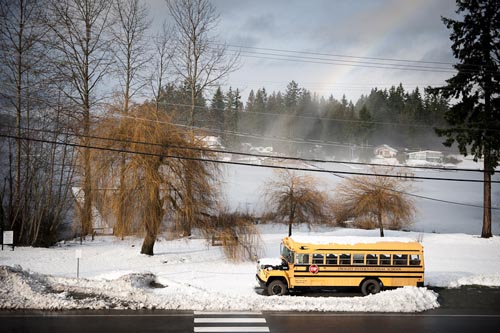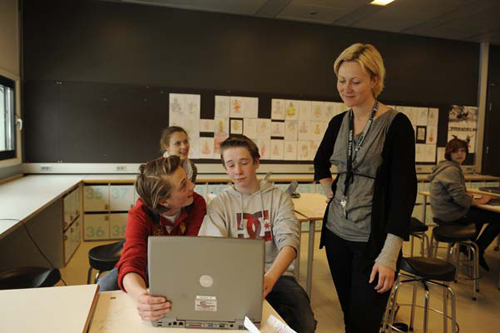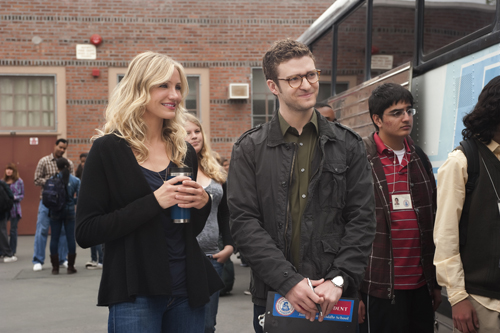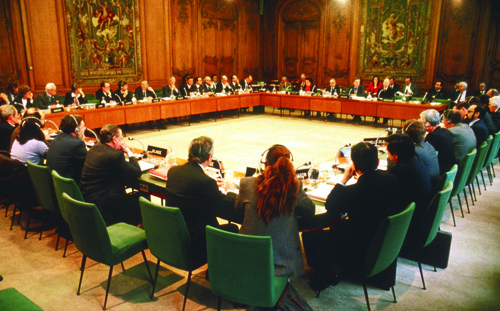
Professor Charles Ungerleider tells me he wrote his book, Failing Our Kids — How we are Ruining Our Public Schools (McClelland & Stewart, 2004), after he completed a term as Deputy Minister of Education for British Columbia. کے 40 years he had observed the Canadian education system from a variety of vantage points: as teacher, پروفیسر, trustee, والدین, and deputy minister. اس مدت کے دوران, he watched the largely successful Canadian educational system become so overburdened with increasing demands, he believed the system would ultimately collapse unless expectations were properly reconsidered.
Charles Ungerleider is Professor of Sociology of Education at the University of British Columbia. He is also Director of Research and Managing Director of Directions, Evidence and Policy Research Group. اس ہفتے میں تعلیم کے لئے گلوبل تلاش, he discusses our big picture questions and shares his views on how to nurture and support a successful education system. (ایڈیٹر کا نوٹ: Canada currently ranks in the top 10 countries in all the PISA test subjects, well ahead of the U. S.)
تعلیمی نظام کی کس قسم کی عالمی سطح پر مقابلہ کرنے کی ضرورت لوگوں کی مہارت حاصل کرنے کے لئے ایک ایسے ملک کی اجازت دے گا?
There is an inherent tension in education between its traditional mission of social development and nation building, and the post war development of human capital and international economic competition. The extreme post war emphasis on economic development is a burden on public schools because the ability to compete economically with other nations is not entirely, or even mostly, dependent upon the education system.
I bristle a little bit when people talk about global competitiveness, because I worry we’re focused on global economic competitiveness and sacrificing social and cultural development. Every society wrestles with the question of what kind of an educational system it will create to realize its vision of itself as a nation. I worry about an education system that cultivates its human capital to produce economically and ignores the social and cultural development of its people.
معیاری ٹیسٹنگ پر اپنے خیالات کیا ہیں?
I am not an opponent of standardized testing, but I am an opponent of high stakes standardized testing. I am opposed to punishing schools and teachers on the basis of standardized testing results and depriving them of the resources they need to improve learning. Anyone who thinks about assessment will recognize that a child’s performance on any given assessment is the cumulative expression of all their prior learning, not just what happened that year or in that school. اس کے علاوہ, 70% of the variation in student achievement is accounted for by factors outside of the control of schools. صرف کے بارے میں 30% of the variance in student achievement is attributable to school related factors, and only about half of those are ones that we can explain.
Recognizing the 70/30 ratio has two important implications for those who wish to improve student achievement. سب سے پہلے, assessment is the starting point, not the end point. What you have to be able to do is identify school factors amenable to policy influence that are capable of affecting change in student achievement. دوسرا, you will maximize the benefits of the school’s efforts if they are complemented by policies to support families and communities, such as living wages, equal pay for work of equal value, generous maternity and parenting leaves, affordable day and after school care, and the like.

“I worry about an education system that cultivates its human capital to produce economically and ignores the social and cultural development of its people.” — چارلس Ungerleider
What is the biggest school factor that affects change in student achievement?
The most important thing is the teachers in the classroom. You are not going to do anything of any serious consequence to improve student achievement or accomplish any serious educational purpose without ensuring that you have well-educated, well-prepared professionals in the classroom. It is not the material or the way schools are organized, but the teacher who makes most of the difference in the school’s contribution to student achievement. Excellent teaching means recruiting people who have the requisite knowledge and dispositions to the tasks, and paying them well.
What are the main steps that must be taken to improve the caliber of teachers in the public education system?
The initial professional preparation that teachers receive, and the continuing professional education that occurs over the course of their careers, influence their performance. Despite improvement over time, the preparation that teachers receive is more guided by ideology than evidence, and is not commensurate with the challenges that teachers face. Teacher certification authorities could help by strengthening the standards by which applicants for initial certification are evaluated and by applying standards that ensure currency of professional knowledge and practice.
مسابقت میں اضافے اور حصول کے دباؤ کے پیش نظر آج بچوں کی جذباتی بہبود کو بہتر طریقے سے حل کرنے کے لیے کیا کیا جا سکتا ہے؟?
This is the first generation in the history of mental health statistics where the mental health of the kids is not superior to that of their seniors. It is much harder to grow up today. We had a more nurturing and respectful notion of child rearing in the past.
As a society, we are not as concerned about the young as we once were. The attention of the community has moved away from being nurturing and raising the young to how am میں کر. Am میں going to be all right? اور, how does my child’s achievement reflect on مجھے?
We need to equip kids with the dispositions and the knowledge that they need in order to thrive in a changing world. We also need to think about the dispositions that people need to live in community with others, to contribute socially and culturally to their communities. For this, a caring and nurturing environment is important.
Aside from addressing the family and economic issues of students in poverty, what are the main steps you would take to improve the academic capabilities of these students?
Students living in impoverished circumstances often exhibit inadequate school readiness. There are a number of policies that will help to address the problems:
o Equip kindergarten classrooms with toys and materials appropriate to learning numbers, colors, and shapes. o Provide opportunities for students to develop fine motor skills. o Encourage oral expression. Ensure that teachers answer students’ میں سوالات, listen to their speech, respond to their requests, and help them demonstrate some achievement. Provide an environment in which children are emotionally supported and teachers use complex vocabulary and sentences in their communication with them. o Ensure that teachers take children out of school to explore the community and to visit neighborhood institutions. o Ensure that teachers display the products of student school work in visible places within the school and in the community. o Administer diagnostic assessments of (1) phonemic awareness, (2) vocabulary, (3) letter naming, اور (4) single word reading; provide interventions to address identified deficits, and ensure that teachers concentrate on deficiencies in these areas, monitoring student progress until students consistently meet or exceed grade level expectations.
ورلڈ حکمت
1. We should be concerned about an educational system that cultivates its human capital to produce economically and ignores the social and cultural development of its people.
2. 70% of the variation in student achievement is attributable to factors outside of the control of schools. Successful education depends upon complementary social policies.
3. The most important factor that affects student achievement is the teachers in the classroom. 4. Professional preparation and ongoing education of teachers are essential factors in teacher performance.

Photos provided courtesy of the Dwight International School in Canada and Charles Ungerleider.
میں تعلیم کے لئے گلوبل تلاش, سی میں شامل ہونے. M. سر مائیکل باربر سمیت روبن اور عالمی سطح پر معروف فکری رہنماؤں (برطانیہ), ڈاکٹر. لیون Botstein (امریکہ), ڈاکٹر. لنڈا ڈارلنگ-ہیمنڈ (امریکہ), ڈاکٹر. مادھو چوہان (بھارت), پروفیسر مائیکل Fullan (کینیڈا), پروفیسر ہاورڈ گارڈنر (امریکہ), پروفیسر کریں Yvonne ہلمین (نیدرلینڈ), پروفیسر کرسٹن Helstad (ناروے), پروفیسر گلاب Hipkins (نیوزی لینڈ), پروفیسر Cornelia Hoogland (کینیڈا), مسز. چینٹل کوفمین (بیلجیم), پروفیسر ڈومینک Lafontaine (بیلجیم), پروفیسر ہیو Lauder (برطانیہ), پروفیسر بین لیون (کینیڈا), پروفیسر بیری McGaw (آسٹریلیا), پروفیسر R. نٹراجن (بھارت), شریدر رازگوپالن (بھارت), سر کین رابنسن (برطانیہ), پروفیسر Pasi Sahlberg (فن لینڈ), Andreas کی Schleicher (پیسا, او ای سی ڈی), ڈاکٹر. ڈیوڈ Shaffer کے (امریکہ), ڈاکٹر. کرسٹن عمیق کر رہے ہیں (ناروے), چانسلر اسٹیفن Spahn (امریکہ), ایوز Theze (اسکول Français کی امریکی), پروفیسر چارلس Ungerleider (کینیڈا), پروفیسر ٹونی ویگنر (امریکہ), پروفیسر Dylan کے Wiliam (برطانیہ), پروفیسر تیو Wubbels (نیدرلینڈ), پروفیسر مائیکل نوجوان (برطانیہ), اور پروفیسر Minxuan جانگ (چین) وہ تمام اقوام کو آج سامنا ہے کہ بڑی تصویر تعلیم سوالات دریافت کے طور پر. تعلیم کمیونٹی پیج کے لئے گلوبل تلاش
C. M. روبن وہ ایک موصول ہوئی ہے جس کے لئے دو بڑے پیمانے پر پڑھا سیریز کے مصنف ہے 2011 میں Upton سنکلیئر ایوارڈ, "عالمی تعلیم کے لئے تلاش کریں" اور "ہم کس طرح پڑھیں گے?"وہ تین bestselling کتابوں کے مصنف بھی ہے, سمیت Wonderland میں یلس اصلی.
C پر عمل کریں. M. ٹویٹر پر روبن: www.twitter.com/@cmrubinworld






حالیہ تبصرے